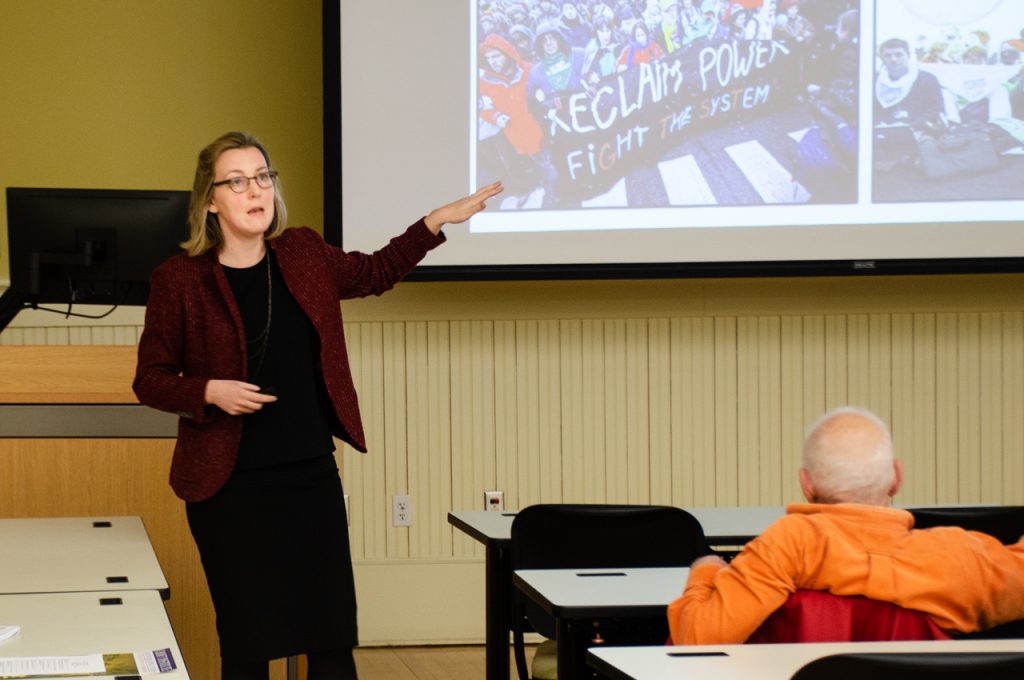
For University of Maryland professor Jennifer Hadden, climate change is not about science; it’s about justice.
Hadden spoke on Monday night at the Croft Institute for International Studies and addressed how the shift from science to justice-based climate change advocacy has affected non-governmental organizations’ (NGO) strategies in Europe.
She explained how the 2007 United Nations Climate Change Conference in Bali, Indonesia, changed the way climate activists related their findings to the public: they transitioned from using climate science to using “climate justice” to promote the cause.
“Climate justice tends to frame climate change as an ethical and political issue, rather than purely an environmental or physical issue,” Hadden said.
With that shift, people began to see that climate change is not something that affects only nature but also humanity, and this year, students at the university are tackling climate change firsthand, including in the classroom.
Journalism professor Charlie Mitchell is teaching a course this semester in which students report news stories concerning climate change in Mississippi. Students evaluate the issue from a variety of aspects, ranging from health and agriculture to the seafood industry and weather events.
Mitchell argued that, while politicians tend to make climate change a political issue, it is not really political at all.
“Climate change is a global matter with local components, and the plan is to offer details about what Mississippians are experiencing and what’s being done or researched that is especially relevant to Mississippians,” Mitchell said.
Climate change particularly affects disadvantaged people, who are often exploited for resources and labor, as opposed to wealthier people, who typically cause a large share of the problem.
“Those who are least responsible for climate change will suffer the worst consequences,” Hadden said.
In 1995, the United Nations Framework Convention on Climate Change recognized around 200 NGOs. In 2017, the number of organizations rose to over 2000. Hadden attributed this growth to an increase in youth participation in climate activism and backlash to capitalist practices, which are often deemed responsible for climate issues.
“People that cause the problem probably won’t experience the effects of the problem,” Hadden said. “It’s really their children, or their children’s children, who will see the impacts.”
As climate change activism has adopted a less scientific — and more political — attitude, Hadden argued that government entities now have more of an incentive to comply with protesters. Not doing so can be politically costly.
“The idea is that (when) we talk about something in terms of justice, you bring in more people, so you have a bigger constituency,” Hadden said. “That helps with your political heft, but you also raise the stakes for not cooperating.”
Whereas some rallies once had about 50,000 people, the 2014 People’s Climate March in New York City boasted 300,000 participants worldwide, according to Hadden. The difference is in the various politically driven communities and organizations who have rallied around the “climate justice” message.
“When you bring in trade unions, groups that represent women and all sorts of different constituencies, you get an unprecedented amount of mobilization,” Hadden said.
Hadden argued that the “climate justice” framing of the climate change movement spurred figures like Greta Thunberg, whose “Fridays For Future” movement spread across the globe in 2018 and 2019. She alluded to the Thunberg-inspired strike at Ole Miss in September 2019 when numerous protesters filled the Circle with signs.
Jade Chalkley, a sustainability fellow of the university’s Office of Sustainability, said students should continue to be the ones leading climate change activism because climate-related issues will never go away.
“It is always important for students to lead change, though, as students are the age demographic that will be seeing the largest effects of the climate crisis in their lifetimes,” Chalkley said. “Sustainability is not a destination.”
Dr. William Schenck, the associate director of the Croft Institute, which hosted Hadden, said that teaching students constructive ways to protest is beneficial to moving forward.
“People (at the university) are interested in learning how others around the world organize and what issues they are concerned about,” Schenck said. “Faculty and administration should support students who are advocating in a positive way, even if they don’t necessarily agree with all the aims.”
Bella St. Amant, a senior Croft student, argued that the university needs to foster more open dialogue on climate change, including protests.
“Specifically in climate change, I think that would be good — at least having opportunities to talk about the issue or to talk about local, grassroots-level efforts to take care of what we can while we can,” St. Amant said.














